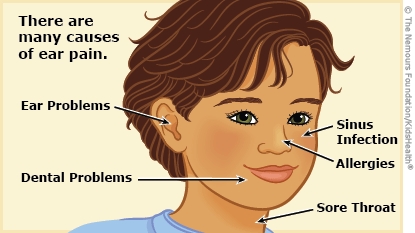Ear Pain: How to Care for Your Child
Kids who have ear pain don't always have an ear infection. They might have irritation from fluid behind the eardrum, allergies, a cold or sore throat, earwax buildup, a dental problem, or a sinus infection.
Your child does not have an ear infection at this time. Follow these care instructions to help your child feel better.


-
Give your child any prescribed medicines as directed by your health care provider.
-
You can give medicine for pain if your health care professional says it's OK. Use these medicines exactly as directed:
-
acetaminophen (such as Tylenol® or a store brand)OR
-
ibuprofen (such as Advil®, Motrin®, or a store brand). Do not give to babies under 6 months old.
-
Don't give aspirin to your child. It could lead to serious medical problems.
-
Try a cool or warm compress on the outside of your child's ear.
-
Older kids who complain of ear pain when lying down can sleep using an extra pillow. If your child is less than 1 year old, do not put pillows, blankets, or anything else in the crib.
-
If the ear hurts during swallowing, your child should eat a soft diet and avoid chewing gum.
-
Do not use ear drops or earwax removal products unless instructed to by your health care provider.
-
Do not stick objects such as cotton swabs, fingers, or other objects in the ear.
-
Follow your health care provider's recommendation on when to follow up.

-
The ear pain gets worse or doesn't start to get better in a few days.
-
There is swelling and redness behind the ear.
-
Pus or blood drain from the ear.
-
Your child starts vomiting or develops a fever.

If my child has a virus, will antibiotics help? No. Antibiotics do not work against infections caused by viruses (such as a cold, the flu, and many ear infections). Antibiotics treat infections caused by bacteria (such as strep throat or some ear infections).
Note: It's important to remember that antibiotics can have side effects (such as nausea or diarrhea). They also can lead to antibiotic resistance. This is when bacteria change in a way that makes antibiotics not work as well. The resistant bacteria can spread to others and cause serious infections.
How will I know if my child has an ear infection? The only way to know for sure if a child has an ear infection is through a careful examination by a health care provider. If your child's ear pain doesn't go away in a few days or your child gets new symptoms like ear pain that gets worse or a fever, call your health care provider right away. Follow up as directed so you can make sure your child is getting better.